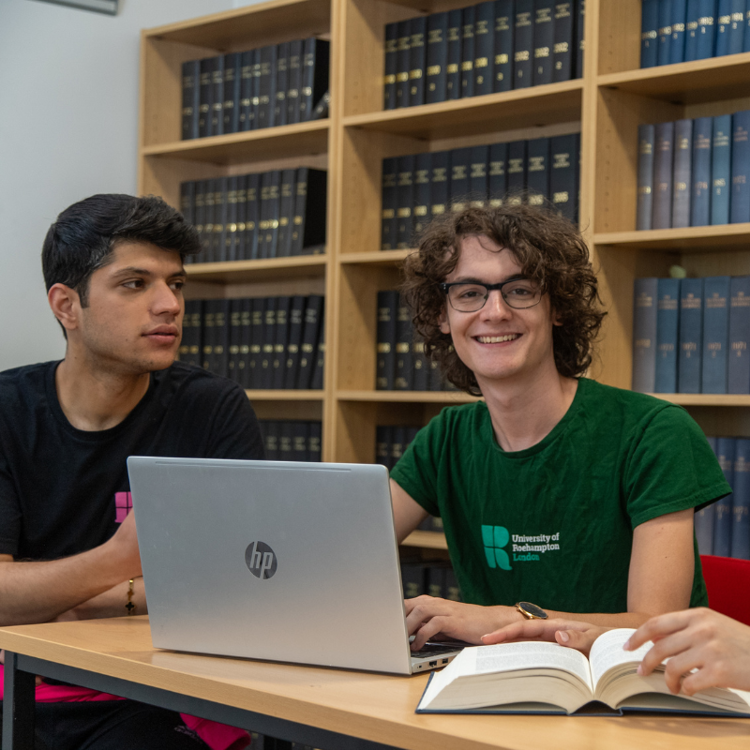/ Undergraduate /
Start date:
September 2025
You'll need:
112–128 UCAS points (or equivalent)
Foundation Year: 64–80 UCAS points (or equivalent)
UCAS code:
M100
M101 (If choosing Foundation Year)

On-Campus Open Day
Saturday 12 July 2025
Launch your career in law with our LLB (Hons) Law degree. Start your journey in law with a degree that lets you take control. Explore Legal Practice, Commerical Law and International Law and Human Rights pathways to find the legal career that suits you best.
Did you know?
We are a top 20 law school in England for student satisfaction (Complete University Guide 2025), taught by leading law experts
Top 3 modern university in London
(Complete University Guide 2025)

Ranked in the top 15% in the world
Times Higher Education Young University Rankings 2024

We're in the top 10 in London for student satisfaction in Law
National Student Survey 2024

Foundation Year
This course can also be studied with a foundation year (September entry only).
Modules
This module provides an introduction to the structure and functions of the English legal system, an opportunity to explore the ethical dimensions of the practice of law and to develop fundamental research and reasoning skills to provide a sound basis for studying undergraduate law modules.
In taking this module you will develop an understanding of the organisation and structure of the English legal system and the main principles and ethical considerations which underlie legal institutions, law making and the conduct of legal professionals.
The purpose of this module is to provide students with a comprehensive overview of the concepts and characteristics of public law in the United Kingdom. It explores the constitutional arrangements of the United Kingdom and related fundamental principles like the rule of law.
It also examines the relationship between the state with emphasis on civil liberties and human with a particular focus on police powers, freedom of assembly and public order. At the end of the module, students will be able to explain the key principles of public law and human rights and be able to place them within contemporary debates relating to the wider issues of constitutional and political reform.
This module introduces the fundamental notions of contract law as developed in England and Wales. Contracts form the basis of business relationships and shapes inter-personal relations in several areas of life. Students will explore the life cycle of a contract from formation to discharge.
The course will address the obligations of contracting parties and the legal remedies available if things go wrong. Students will appreciate the links between contract law and other areas of law, such as tort law. Contract law also underpins specialist bodies of contracting rules, such as commercial law and employment law, which are available as optional units during your programme. Students will explore how concepts of contract law are developed through case law and understand the relationship between case law and statute. Students will develop the ability to identify the relevant law applicable to the facts presented by a legal problem, recognise the existence of competing arguments and communicate their findings clearly.
This will assist the students in their preparation for professional life, enabling them to develop the ability to present reasoned and logical arguments both orally and in writing.
The purpose of this module is to introduce students to key criminal law concepts and principles such as what a crime is, actus reus and mens rea. The module will focus on general principles of criminal liability alongside study of a range of offences such as murder, rape, manslaughter, non-fatal offences against the person and theft. The module will detail the key principles such as how a defendant may participate or be an accomplice in a crime; general defences to crimes; and the liability of a person for attempted crimes.
Students will be able to define and explain the basic ingredients of a range of criminal offences and defences and apply legal principles, case law and legislation to factual scenarios.
These modules are those we currently offer and may be subject to change.
This module will focus on the fundamental concepts and principles concerned with ownership and the way in which the law engages with the concept of property . The module starts by considering the meaning of ‘property’ and the consequences of using property-based rules to regulate the use and transfer of land. Students will develop the ability to identify the different rules relating to ownership of land and legal rights and interests attached to land.
Students will also consider how the law adapts longstanding concepts to modern practices and policies, including the means through which property is governed under the legal system and where gaps, if any, exist in the management of property as a legal concept. This module is concerned with the law of England and Wales.
The law of torts is a branch of private law that imposes civil liability for breach of obligations owed by both individuals and organisations to one another. This purpose of the module is to develop students' knowledge and understanding of the foundational tort of negligence and its application in specific settings (e.g. actions of public authorities, occupiers’ liability); the distinction between negligence and strict liability; kinds of injury that tort law deems worthy of compensation (especially the complex position with regard to psychiatric and economic harm); and the kinds of remedy that it provides to claimants.
The module also develops key skills, in particular the module will nurture students' ability to develop a reasoned legal argument and to evaluate the merits of competing legal arguments, for example in relation to legal remedies and crossover with the Law of Contract. The module helps to develop students' transferable intellectual and professional skills, in order to prepare them for further study and legal practice.
The purpose of this module is to provide the opportunity to study in depth and in context certain areas of constitutional European Union Law after Brexit. On completion of this module students should be able to demonstrate knowledge and understanding of the decision-making process, sources of retained EU Law, the principle of supremacy, and the legal remedies for enforcing EU Law. Students will also develop fundamental evaluative, research and problem-solving skills to provide a sound basis for studying undergraduate law modules.
The trust is a distinctive aspect of English law that has implications in areas such as family law, property law and tax. Principles of Equity are fundamental to the English legal system, taking a more flexible approach to various legal issues and providing fair outcomes where the common law is unable to do so. This module explores the equitable principles governing the creation, operation and administration of public and private trusts and examines the reasons for creating trusts in the contemporary social, economic and international context. Contemporary issues in this area may include the legal problems raised joint ownership of property outside of the family relationship.
Students will study the rights, duties and powers of settlors, trustees and beneficiaries and develop the ability to apply relevant legal principles to complex fact patterns. Students will learn when a fiduciary relationship exists and how to recognise when a non-express trust may be imposed by equity. Students will explore the evolving use of equitable remedies and the modern-day use of the law of trusts.
These modules are those we currently offer and may be subject to change.
This course offers all students the option of a one-year paid work placement, to boost your employability even further. If you choose this route, you will take the placement following year two of your course, and then return to complete your degree.
Why take a placement?
A placement year is the perfect opportunity to gain valuable work experience, to build on the career skills we will teach you on this degree. The connections you make on the placement will improve your career prospects further, and equip you with the skills you need to secure graduate-level employment.
How we support you
The University's Placement and Work Experience Team are experts at helping you to secure a placement. They will work closely with you from the start, helping you research potential employers, discover placement opportunities, create and pitch your CV, and will coach you to perform well in interviews. We aren't able to guarantee a placement, but our sector-leading advisors will give you the best possible chance of securing one.
Find out more about how we'll support you
We understand that your plans might change once you start your programme. If you decide not to do a placement, you will have the option of completing the three year version of your programme.
Whatever your choice, you will have access to many opportunities for work experience through our Placement and Work Experience Team, and access to face-to-face and 24/7 online careers support.
This purpose of the module is to provide a basic introduction to the structure and functions of business enterprises and to explore the legal theories, rules and commercial drivers that influence the practice of law concerning limited companies, partnerships and other business models.
This module will complement the Law in Practice Year 2 module. In studying this module, students will develop evaluative and analytical skills in understanding the nexus of law and commercial awareness that shapes the behaviours and actions of business enterprises and their stakeholders.
This module introduces the fundamental principles of wills, probate, and estate administration. Students will explore the legal requirements for valid wills, the rules of intestacy, and the processes for distributing a deceased person’s assets.
The module develops skills in applying legal principles to practical scenarios, enhancing legal research and reasoning abilities to prepare for professional practice in probate law.
This module introduces the foundational principles of public international law governing relations between states and international organizations. Students will explore sources of international law such as treaties, customary practices, and legal doctrines.
The module covers key topics including state sovereignty, jurisdiction, human rights, and the laws regulating the use of force. Students will develop skills in applying international legal principles to contemporary global issues, enhancing their legal analysis and critical thinking abilities. This prepares them for professional practice or further study in international law by providing a solid understanding of the international legal system.
The purpose of this module is to provide students with a comprehensive overview of the theory and practice of international and regional legal frameworks in place to protect human rights, the shared environment as well as international trade and co-operation. Wherever possible, the discussion of international human rights law will relate to contemporary developments in human rights to foster global and cultural insights and enable students to assess how it is used in practice. In particular, students will look at a broad and critical appreciation of the history, theory, politics and practice of the International Law of Human Rights and compare, contrast and evaluate different regional and international approaches to the protection of human rights. After completion of this module, students should be able to effectively apply their knowledge to address contemporary developments and challenges and contribute critically to key issues in this field.
The purpose of this module is to provide an excellent opportunity for students to develop and apply a range of competences associated with legal practice. The overall aim of the module is to enhance students' work-related skills by undertaking practical work in a legal environment and critically evaluating and reflecting on their experience. The module introduces key skills in client care and professional ethics as well as the exposure to a diverse range of legal issues.
Students will need to manage their own learning within the Centre and outside the class-based environment. Key to the module is the need for the student to explore the relationship between the study of law as an academic discipline and the practice of law and its application in the working environment.
Students are encouraged to use reflection to enhance, refine and develop personal theories of professional practice, with due regard to ethical, conceptual and contextual needs and/or outcomes.
The purpose of this module is to provide an understanding of the fundamental principles of UK tax law and an appreciation of its relevance across a wide range of legal disciplines including, succession, sales, business, enterprise, employment and land law.
In furtherance of the Law School's Employability objectives the module also provides a foundation in the difference between financial and commercial concepts relevant to tax law, such as income, profit, loss, gains, wealth and dutiable items. Students will learn about the policies informing fiscal legislation, the budgetary process, and the place of tax in the commercial and legal context.
The module focuses on legal principles, policies and regulation and fosters the skills of handling complex legal material, reading and interpreting statutory material, and understanding and interpreting the structure of language.
The purpose of this module is to provide students with an overview of the practical and legal aspects of the sale and purchase of a business of company. At the end of the module students should be able to understand the structure of a sale and purchase and the implications for all parties of the terms agreed. The module will also explore different methods of financing businesses.
The module builds on the basic concepts explored by students in the Contract Law modules and helps develop their skills of analysis and commercial awareness, addressing a client's financial and business needs and finding solutions to client problems. The module will develop the students' ability to translate their legal knowledge and skills into the practical context of commercial transactions.
This module introduces the fundamental principles governing commercial transactions and business relationships. Students will explore key topics such as the sale of goods, agency, negotiable instruments, and secured transactions. The module focuses on the legal frameworks that regulate commercial activities, including relevant statutes and case law.
Students will develop skills in applying legal principles to real-world commercial scenarios, enhancing their analytical and problem-solving abilities. This module prepares students for careers in legal practice within the commercial sector, providing the knowledge necessary to navigate complex commercial legal issues.
These modules are those we currently offer and may be subject to change.
This course offers a foundation year, which takes place at the beginning of your studies. Studying a foundation year will give you academic and practical experience, and a strong introduction to your subject, ensuring you succeed on your undergraduate degree.
30 credits
You will develop your core academic and integrated English language skills of speaking, listening, reading and writing. You will become familiar with key academic skills and concepts, such as referencing methods and awareness of academic integrity and tone. You will apply these skills and knowledge to both broad topics and also your chosen subject pathway.
Teaching and learning
You will be required to actively engage in on-campus learning for up to 10 hours a week.
You will be taught through a full range of teaching and learning methods, which include lectures, seminars, workshops, discussion groups, group directed tasks and presentations. This will enable you to learn from your peers and tutors in both structured and information settings.
You will be encouraged to think creatively about your approach to learning and discussions with your peers. You will also have access to recordings, resources, links and signposting through Moodle to enrich your learning.
Assessment
You will be assessed through group and individual presentations, comparative and reflective essays, multiple choice exams, coursework and reports, oral exams, portfolios, case studies and blogs.
30 credits
You will develop your research, numeracy and information technology skills. You will investigate the difference between primary and secondary research, conduct your own research project and demonstrate your findings through data analysis. You will also develop your awareness of equality, diversion and inclusion in the UK, through a real-world issue; discrimination in the workplace.
Teaching and learning
You will be required to actively engage in on-campus learning for up to 10 hours a week.
You will be taught through a full range of teaching and learning methods, which include lectures, seminars, workshops, discussion groups, group directed tasks and presentations. This will enable you to learn from your peers and tutors in both structured and information settings.
You will be encouraged to think creatively about your approach to learning and discussions with your peers. You will also have access to recordings, resources, links and signposting through Moodle to enrich your learning.
Assessment
You will be assessed through group and individual presentations, comparative and reflective essays, multiple choice exams, coursework and reports, oral exams, portfolios, case studies and blogs.
30 credits
This module supports a broad exploration of crime and law and its integration within society across various sources, which includes diverse cultural, social, and political representations. By analysing a wide range of topics, you are encouraged to critically engage with how disability, gender and race are represented and viewed in relation to crime and law.
This course integrates sustainability by looking at the sustainability of social interactions and your results and consequences in relation to crime and law. Social responsibility, legal injustice across the globe and inequality are all featured. Social Responsibility is embedded through topics such as social identity, prejudice and exclusion. Social Cognitive Theory and Rational Choice Theory helps you understand challenges and question accountability for individuals and communities.
This course fosters global engagement by examining the inequalities experienced in other cultures, particularly in relation to race, gender and exclusion. Global challenges are addressed at every step equipping you with the skills to navigate a globalised world in a variety of ways. By analysing data and text concerning diverse cultures and contexts, you will develop an understanding of how individuals and cultures operate amongst injustices in a globalised world, preparing you to engage thoughtfully with diverse audiences.
Teaching and learning
Through lectures, workshops, group work, and structured academic writing, you will have the opportunity to practice the core academic skills needed for your future studies. Critical thinking will be developed through tasks such as text analysis, group discussions, and the ability to create well-structured academic assignments, including essays and presentations.
The teaching delivery for each module consists of one, one-three-hour lecture and one, two-hour workshop per week. You will get a diverse learning experience through case studies and active learning workshops and microteaches.
You will also have an additional 30 minutes of online support each week, consisting of activities to develop your presentation skills and to provide you with opportunities to explore wider policy implementation in diverse/comparative transnational examples.
Assessment
This module will be assessed using a video presentation and summative essay.
30% - video presentation, working in groups, you will produce a video on a topic taught on the curriculum and explain its impact on UK society, using a real-world example.
70% - summative essay, you will identify an issue, either historical or contemporary, that has had an impact on UK society and connect it to at least one of the key topics covered in the course.
30 credits
This module provides you with some foundation for the study of the English Legal system. You will examine how legal rules are made and applied and become familiar with some of the special vocabulary of the law, as well as introducing you to the essential skills of the legal profession. For example, how to read legal cases and Statutes (Acts of Parliament).
You will also learn about some of the key institutions and processes that make up what we understand as the English Legal System.
The module will be taught at an introductory level using different teaching methods, and it will lay a foundation in understanding aspects of the legal process and the key features of English Common Law, Precedent, Statute Law, Separations of Power, an unwritten Constitution, trial by Jury and the rule of Law, to create a dynamic and resilient legal system.
You will develop an in-depth understanding of the different Court systems, Court processes, professional conduct rules and litigations in court. You will also gain background information on how the legal world functions.
Teaching and learning
The module follows a thoughtful combination of theory, applied learning and reflective practices. By emphasising real-world applications, ethical considerations and global awareness in the design, the module will prepare you to become responsible, skilled and adaptive legal professionals.
The teaching delivery for each module consists of one, one-three-hour lecture and one, two-hour seminar per week. Seminars will consist of individua and group activities.
You will also have an additional 30 minutes of online support each week, which will consist of individual tasks such as quizzes, posting on discussion forums, watching videos and taking notes and reading articles and chapters.
Assessment
This module will be assessed using an in-class open book, multiple choice questions and an individual legal report.
40% - open book, multiple choice questions.
60% - individual written report, choose from ‘discuss the extent to which the sources of law has provided certainty for lawyers that are providing legal advice or writing a report to demonstrate the legislative process, precedent and statutory interpretation rules.
These modules are those we currently offer and may be subject to change.
“I am proud to support a university that is committed to empowering students from all backgrounds to achieve their potential.
"As the first in my family to go to university, where I also studied law, I know the importance of finding the right environment in which you feel able to develop and thrive: an environment in which you learn not just the academics of law, but also skills which equip you for your future career. Roehampton is not just a Law School, but a gateway to meaningful careers both in law and in professions in which a law degree forms a solid and valuable base.”
Lyndsey Doud, Chair of the Law School Advisory Board

Skills
Think like a lawyer from day one.
Our specialised pathways, designed in partnership with law professionals, will give you the advanced skills and experience you need for various legal careers.
By choosing Roehampton, you will:
- Study a top-rated degree: we are a top 20 law school in England for student satisfaction (Complete University Guide 2025), taught by leading law experts
- Get hands-on experience: be part of the Roehampton Legal Advice Centre, expanded for 2025, working with practicing solicitors on real cases
- Graduate with a recognised qualification: our LLB is recognised by the Bar Standards Board as an appropriate degree for purposes of the academic component of the training
- Network with prospective employers: benefit from events and mentorships with leading law professionals who are part of the Roehampton Law Advisory Board network
LLB Law students visit Kingston Crown Court
For any law student, visiting a court is essential, especially for those looking to progress into a legal career.
Our third-year law students visited Kingston Crown Court earlier this year, and were able to gain a deeper understanding of law in practice, following on from the legal skills they have been developing in our Law Clinic.

Learning
Get ahead with our ‘law in practice’ learning environment.
Designed by experienced academics and practitioners, with input from our internationally renowned Centre for Human Rights and Social Justice, this degree will encourage you to see the law in the context of everyday life right from the start.
You’ll spend most of your time in face-to-face classes, developing your understanding of both legal issues and the core skills and competencies legal practitioners are expected to have.
You’ll be taught by experts – former solicitors, barristers and/or active researchers who publish widely in Environmental Law, Human Rights Law, Legal History and Commercial Law.
Beyond the Roehampton Law School, you’ll have opportunities to experience legal work in action through:
- The Roehampton Law Clinic
- Pro-bono placements (in partnership with Wandsworth Citizens’ Advice)
- Industry talks with guest speakers from across the sector
- An optional year-long paid work placement
- Visits to historic legal institutions, including Parliament, the Supreme Court, the Old Bailey, the four Inns of Court, the Law Society and the Royal Courts of Justice
Our students
“Being a part of Roehampton Law School has been transformative. From the start, the teaching has incorporated practical exercises and real-world scenarios, encouraging us to think like lawyers and making the learning dynamic and relevant. Roehampton Law School has given me a space to grow, collaborate, and prepare to make a real impact in my future legal career.”
Shyann Hall, current Roehampton Law School Student
“Roehampton Law School empowers young professionals with the knowledge, skills and integrity necessary to excel in not just academia but in all areas of life.”
Xavier Mcmanus, current Roehampton Law School Student
Stephanie Heringa
Future Pupil Barrister at 2 Bedford Row, Roehampton Law School Graduate 2022
“Roehampton gave me the perfect starting platform for my journey to becoming a barrister. Equipping me with legal knowledge and key practical skills, the Law School's dedicated staff and faculty gave me the confidence necessary to succeed. I felt truly supported by any advice I sought and through every step of the way. I could not have asked for a better environment to launch my legal career and will forever be fond of my time at Roehampton.”

Perfect Osei
Solicitor Apprentice in Local Government, Roehampton Law School Graduate 2020
“The practice-based curriculum and the law clinic equipped me with skills and an insight that laid the foundation for my legal career. The diverse, relatable, and helpful staff truly made a difference; they were passionate about their students' (including myself) learning and development and always made time for us. I am proud to have worked for chambers, local governments, and in private practice, and I can confidently say that Roehampton prepared me to excel.”
Jeffrey Arthur
Trainee Lawyer, Clifford Chance LLP, Roehampton Law School Graduate 2022

Assessment
Evaluate your progress through real-world assessments.
During your time at Roehampton Law School, your projects, exercises, and assessments will reflect the contemporary working world of law, getting you ready for life after graduation.
Many of your modules will also contain a multiple-choice test component.
Career
Whatever your background, take control of your learning by choosing from a range of career pathways each designed to give you the skills and experience you need to start a career in different areas of law.
Our career pathways include:
Legal Practice Pathway
Our unique approach enables you to fast track your career by preparing you for the key Solicitors Qualifying Exam whilst still a student.
Commercial Law Pathway
Develop the key skills to practice as a legal professional in a range of private sector companies.
International Law and Human Rights Pathway
Prepares you for a range of roles in government, NGOs and charities.

The Roehampton careers team is available to support you from the start of your studies until after you graduate.
You’ll benefit from personalised sessions in CV and application writing, presentation practice, mock interviews, and commercial-awareness training. You’ll have the chance to meet future employers through our network of industry partners across London.
Our dedicated Law Careers Advisor will connect you with graduate recruiters and support you through every step of your career planning and job search.
Life at the Law School
Read about the experiences of our law students.
A day in the life of a second-year law student
Hey everyone! I’m Esra Tasdemir, a second-year Law student at the University of Roehampton and this is a day in my life living on campus.
My journey into law
As opposed to wondering “why” I decided to become a barrister, I said: “why not?” This was followed by a fire in my belly of determination and enthusiasm to study Law.
My Citizens Advice placement
As a Law student I was able to choose a Pro Bono initiative with Citizens Advice as one of my modules.
Open days
Get a real taste of our campus, community and what it’s like to study at Roehampton
Applying
Full-time UK undergraduate students apply through UCAS.
Course subject to curriculum enhancement and revalidation.
Entry tariff
112–128 UCAS points (or equivalent)
Foundation Year: 64–80 UCAS points (or equivalent)
Looking to work out your UCAS points or find out about our entry requirements? Find out more.
When we consider applications to study with us, we form a complete view of your achievements to date, and future potential, and can offer flexibility in entry requirements. Find out more about our Contextual Offer scheme.
Specific entry requirements:
A-level (or equivalent qualification) required in Humanities, Social Sciences, and Business preferred.
GCSE (or equivalent) requirement: English and Maths, Grade C / 4.
General entry requirements
September 2025 entry tuition fees
UK (home) tuition fees
Undergraduate degree: £9,535
Foundation Year: £5,760
We offer a wide range of scholarships and bursaries. See our financial support pages for UK students.
We also provide other ways to support the cost of living, including free buses and on-campus car parking, hardship support and some of the most affordable student accommodation and catering in London. Find out more about how we can support you.
International undergraduate students apply through our direct application system.
Course subject to curriculum enhancement and revalidation.
Entry tariff
112–128 UCAS points (or equivalent)
Foundation Year: 64–80 UCAS points (or equivalent)
Looking to work out your UCAS points or find out about our entry requirements? Find out more.
When we consider applications to study with us, we form a complete view of your achievements to date, and future potential, and can offer flexibility in entry requirements. Find out more about our Contextual Offer scheme.
Specific entry requirements:
A-level (or equivalent qualification) required in Humanities, Social Sciences, and Business preferred.
GCSE (or equivalent) requirement: English and Maths, Grade C / 4.
General entry requirements
September 2025 entry tuition fees
EU and international tuition fees
Undergraduate degree: £16,950
Foundation Year: £16,950
International Foundation Pathway: £16,950
We offer a wide range of scholarships and bursaries. See our financial support pages for international students.
We also provide other ways to support the cost of living, including free buses and on-campus car parking, hardship support and some of the most affordable student accommodation and catering in London. Find out more about how we can support you.
Business and Law
Be part of a diverse learning community that values excellence, reflection, inclusivity, ethics and collaboration.






